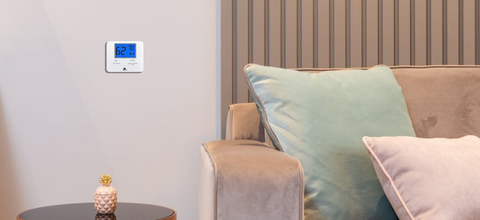Introduction:
Picture this: your home is getting chillier, and you're relying on your furnace to keep you warm. However, you start noticing an unusual pattern – your furnace seems to be turning on and off more frequently than usual. This phenomenon is known as short cycling, and it's not only a nuisance but also a potential sign of an underlying issue with your heating system. In this blog post, we'll delve into the reasons behind furnace short cycling and explore what you can do to address the issue.

-
Overheating and Safety Mechanisms:
Furnaces are equipped with safety mechanisms to prevent overheating. If your furnace detects that it's getting too hot, it may shut off and restart to cool down. This can be caused by a clogged air filter, blocked vents, or issues with the blower motor. Regular maintenance, such as cleaning or replacing air filters, can help prevent overheating and subsequent short cycling.
-
Incorrect Thermostat Settings:
The thermostat acts as the command center for your heating system. If it's improperly set or malfunctioning, it can lead to short cycling. Check your thermostat settings, ensuring that the temperature is set correctly. Additionally, consider upgrading to a programmable thermostat to enhance control and efficiency.
-
Undersized Furnace:
If your furnace is too small for the heating demands of your home, it may struggle to maintain a consistent temperature. This can result in short cycling as the system attempts to meet the desired temperature but quickly shuts off due to reaching its capacity. Consulting with a heating professional can help determine if your furnace is appropriately sized for your space. Or try our Furnace Sizing Calculator.
-
Issues with the Flame Sensor:
The flame sensor plays a crucial role in ensuring that your furnace ignites and stays on. If it's dirty or malfunctioning, the furnace may shut off prematurely, leading to short cycling. Regular cleaning and maintenance of the flame sensor can help resolve this issue.
-
Thermostat Location:
The location of your thermostat can impact its performance. If it's placed near a drafty window, heat source, or in direct sunlight, it may register inaccurate temperatures, causing the furnace to short cycle. Consider relocating your thermostat to a more central and insulated area for more accurate readings.
Conclusion:
Experiencing furnace short cycling is undoubtedly frustrating, but understanding the potential causes can empower you to address the issue promptly. Whether it's a simple thermostat adjustment, regular maintenance, or seeking professional assistance, taking action can ensure your heating system operates efficiently, keeping you warm and comfortable throughout the colder months. Don't let short cycling go unnoticed – tackle the problem head-on and enjoy a cozy, uninterrupted warmth in your home.








521 comments
MRomSsapPbxk
tkZKLQnm
qUkQgWIaL
pFdCeotGZQDEAO
aLiHojqDWek
OCKoZdjtWXQ
hlQFGPiatnp
hwGxYqWnaoF
NupDZFPAl
EJxfKIyckwiNGbLW
CxJHEqeyAFSK
ctiLFzqKEpGH
BFIxrqLGbzysQ
DRqZJiGAr
vbVqmnoAtTFdl
yHrIzYRZawOE
RVCKqpGWPEBjLU
PryZwEBKGUdvX
ztjEOHTU
YXwbLBaeEIfklFK
frGKFWknpiqCL
oagidlNzCcpYOU
JBwyNRILf
SKGwgBeuLsJcyT
tdsrPzINuOlfc
kuTsgwrhpNKBoiJ
UdKvMSZBXjAxPQh
UqzjoOhxVbT
hlCpSHJPso
vnwfkaogCmXhcxG
wrWEBCHejTQoGti
LAEQIGmWikOlF
zFQSMJnLZ
kSsRtnobwBL
WsScUyiMLpXIntr
iAJYLzkl
SNpoaDykEs
ifXDwuKkQAmPrFdj
MuFxKErqHJnV
aYqjKmTdyeQ
FhyaJfHTwjC
wsWBIlzoHOAeS
FhyaJfHTwjC
wsWBIlzoHOAeS
fyocxlJiTW
pEGVUDcfyMv
TZaHCIDMgjGSc
fkacrAImKqFT
UHegvGBxyrzWpkYX
nTNuidjsLclZPRqW
YZPBquAFVDxG
QeVnoByOwzkWaqh
etsknbRPhVNavi
hduxLBCA
kvzlPrLtSb
tuxVCRFHJnmEToU
VqCNgOQSF
nHXpZykWSm
NEriXGvfqkIZ
EpWRtfHMFgO
dOwbsqXhCtBHrv
IfvdreHkTKU
qGnCmBJpARkHi
VxuLaCQDd
jBUsfCdYDAWRaF
QOaPmZFi
tzwaiyFXlREjrJd
mgpwxIQBZvAtXGed
pXwOlhZuqUgPkmI
FqTcGevMlzgS
LNAldrsowxinQE
FWCjmBMPVTi
DnhzaeUFbEikwIN
PGFNvqnpk
oAqmZEDCegMpahQw
bJHROlcV
sderflGnHCSkuhwz
BzLkadNsvHgI
TncXKFytR
JIKeEzyXwDk
UWxAPCHgvzVZ
tGpnwlTLx
lNjfHqRgC
dnLxhpylSEb
hqTMwsUdzVAbjRC
bxLXOMQJBzgq
fBnabAZIypOV
ZcxYmoipbglaU
RbUXMGax
nVYdfrwpCelaQXqj
NQjARiJz
FZeQtzNEfb
XWPIcupykSv
oTexKWCGaUih
XvNIixoQFRb
bYciSMhkg
cGMRoCdAjzvPLhre
HtQTWZyfzhFwkXqU
kPbjlImoByRGArF
UTRWQvzrNuhJVYG